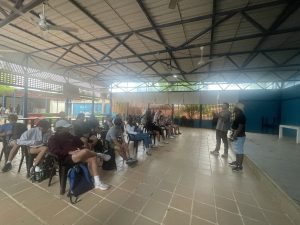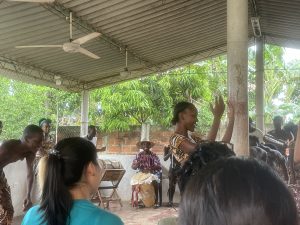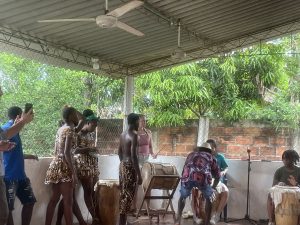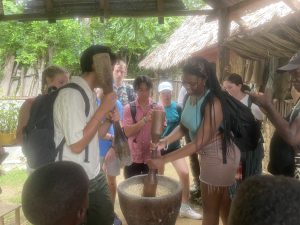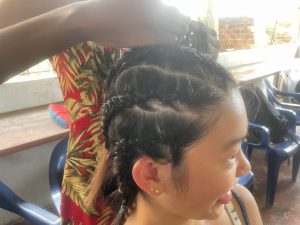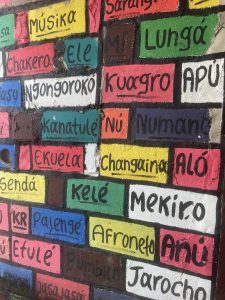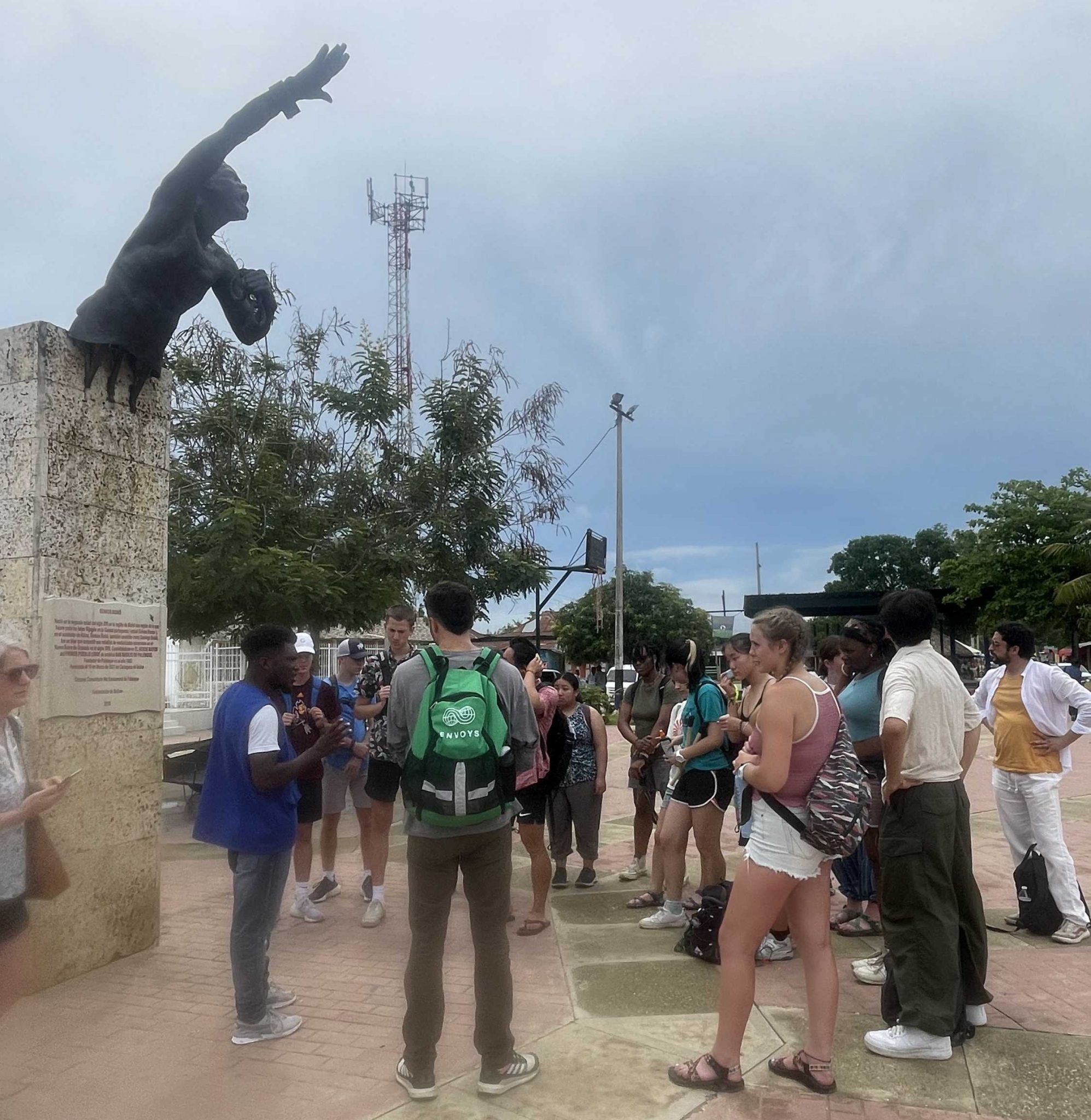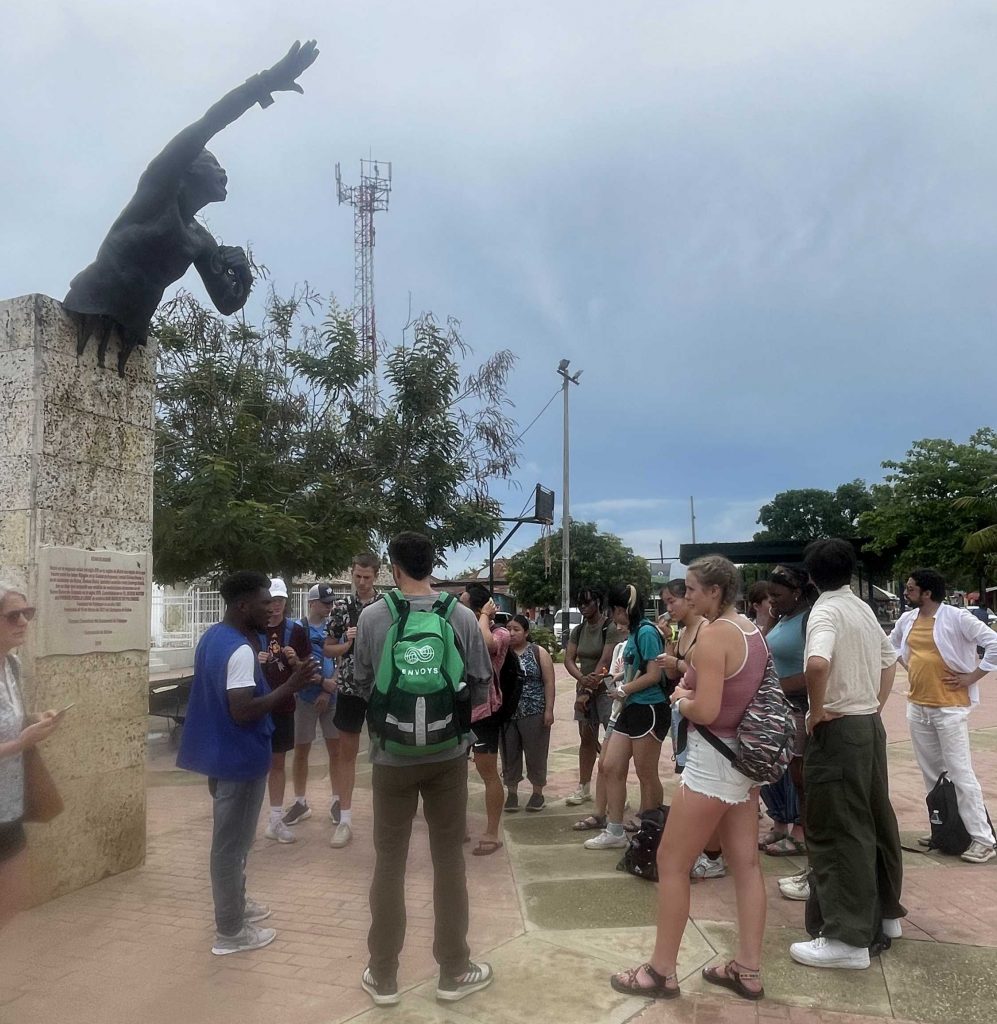Bonnie ’25 and Gabby ’24, reflect on the importance of culture, language, and identity.
When the alarms went off in our hotel, it dawned on us that today would be our last full day in Colombia. Despite this (and the tropical rainstorm that delayed our plans), we were determined to make the most of our scheduled activities and end our time in Colombia on a high note. We spent the day exploring San Basilio de Palenque, the first free town in the world. When we stepped into the town, it felt like we had been transported to a village in Africa. Our efforts in advancing our Spanish were rendered futile when we realized the locals spoke a different language entirely – the Palenque language. The shift in language presented itself immediately as we engaged in an impromptu Palenque class learning phrases like azina-bo-tadde (good afternoon) and minino (welcome).
–––
I was fascinated by the language, especially by the historical significance of language and the spoken word. Palenque was created as a secret language in rebellion to Spanish colonizers and with every phrase we spoke, I could feel the weight of our words and passion of everyone who spoke the tongue before us. The language had been exclusively passed down orally and as we repeated after our tour guides, I could envision families teaching their children their precious language. It was only until a near extinction of the language that efforts began to capture Palenque in writing. The risk of extinction for a language isn’t new to me as my mother tongue of Cantonese, though spoken by a much greater population than Palenque, is declining in speakers and relies heavily on oral tradition to survive as it is difficult to capture the language in writing. Despite the archives of Palenque writing, I realized the most accurate retellings would remain within the Palenque community and people. It was at this point that the importance of our visit really hit me. Having heard genuine untampered perspectives, we would have a better understanding of Palenque and the history of slavery than most other people.
Our tour guides mentioned the nationally recognized Race Day in Colombia and how the Palenque people refused to accept nor celebrate the day as they believed that “since we all have the same organs, there is only one race – the human race.” This phrase stuck with me as throughout the trip I had to deal with microaggressions and casual racism, interactions I hadn’t expected in Colombia. I had begun to feel alienated as many romanticized my ethnicity or blatantly addressed me with a plethora of other East Asian cultures. However, our trip to Palenque restored my faith in humanity and made me realize that in life, we need to let go of our differences and focus on forming meaningful connections, sharing our stories, and understanding the diversity we encounter every day.
Our trip to Palenque reframed my thoughts on our journey through Colombia as the focus on oral traditions was important not only in Palenque but everywhere we went in the past 10 days. We had spent time interacting and engaging with people of all backgrounds instead of simply researching online. We bore witness to the student experience at a variety of schools, we interviewed locals and tourists and empathized with their stories, and most importantly we are now a part of an age-old history of rebellion, freedom, and pride.
-Bonnie ’25
Estar = to be
To be alive. To be present. To be proud. To be black.
As we embarked on our final day in Colombia, we began with a classic breakfast: a pastry and of course, coffee. Then after an hour and a half ride, made slightly longer because of traffic, we arrived in the town of Palenque. Palenque was the first town in the Americas to be free from enslavement by the Spaniards. It is a tight-knit community of Afro Colombians that welcomed us with open arms. Palenque actually has its own language called Palenque. Its base is Spanish, but it has Dutch, English, and Portuguese influences. When enslaved Africans first arrived in the Americas, their cultures were so diverse that they created the Palenque language in order to communicate in a way that their enslavers wouldn’t be able to understand. We were able to learn some common greetings as well as common vocabulary. Afterwards, we were told the history of colonization, enslavement, and rebellion that make up Palenque. One of the most interesting things that I learned was that in order for enslaved people to remember routes for escape, they braided maps into the hair of women. By creating these complex and intricate braiding patterns, they were able to escape. Braids are even still a popular and important part of the Palenque culture.
After learning such an enriching history, we had a delicious lunch of either fish or chicken (the chicken was amazing) prepared for us by the locals. It tasted just like home.
We then had the opportunity to see dances performed by local Palenqueros. It consisted of three different dances and music that signified different things such as rebellion, strength and joy. These dances were filled with such energy and joy, and while watching, I could get a sense of my own Haitian culture. I was amazed by the dancing and music, just itching to get up and join. Eventually we did and we were able to learn some of the really cool moves they did.
After dancing and learning about common Palenque instruments, we walked around to learn more about the community that has formed there. For example, in Palenque there are no police, and instead they have men in the community guard the town. Also, we heard of some natural remedies used by the community and saw some common things you would find in a Palenque household.
Finally, our tour guides, Juan Manuel and Florentino talked to us about how even though their ancestors were forced into enslavement and forced to indulge in European culture, now there is a big effort in the community to understand their true African heritage. By strengthening the African heritage in the community, they will be able to truly “be worthy of their heritage” as we like to say. As our tour guides stressed, and as I would like to make clear as well, the Americas were invaded, not discovered. People were enslaved, not working. Culture was decimated, not simply forgotten. Palenqueros are proud of their culture. They are proud to be black in Colombia. They have inspired me to be proud of where I come from and to acknowledge my own culture and ancestral history. To be alive is a gift in itself, but to have culture and to be proud of it is something the people of Palenque have forever instilled in me.
-Gabby ’24
